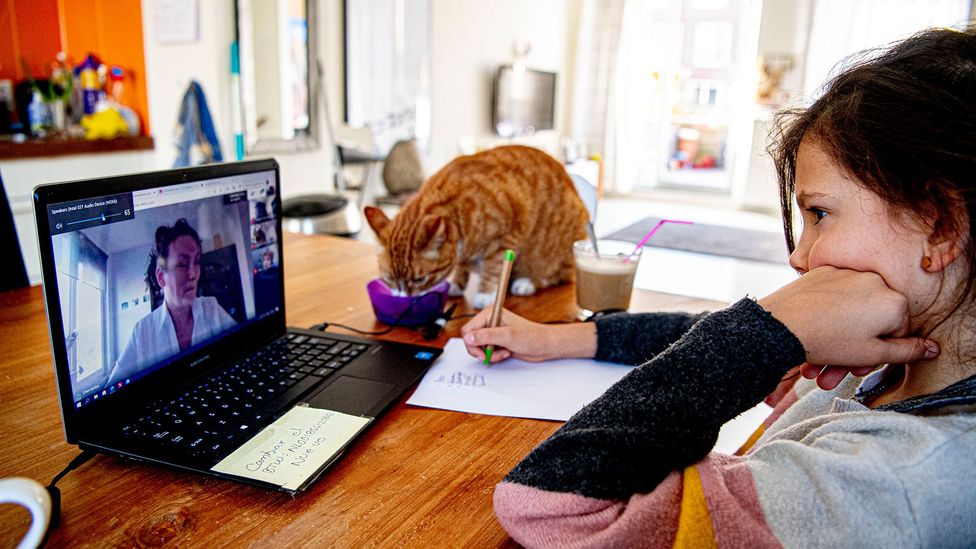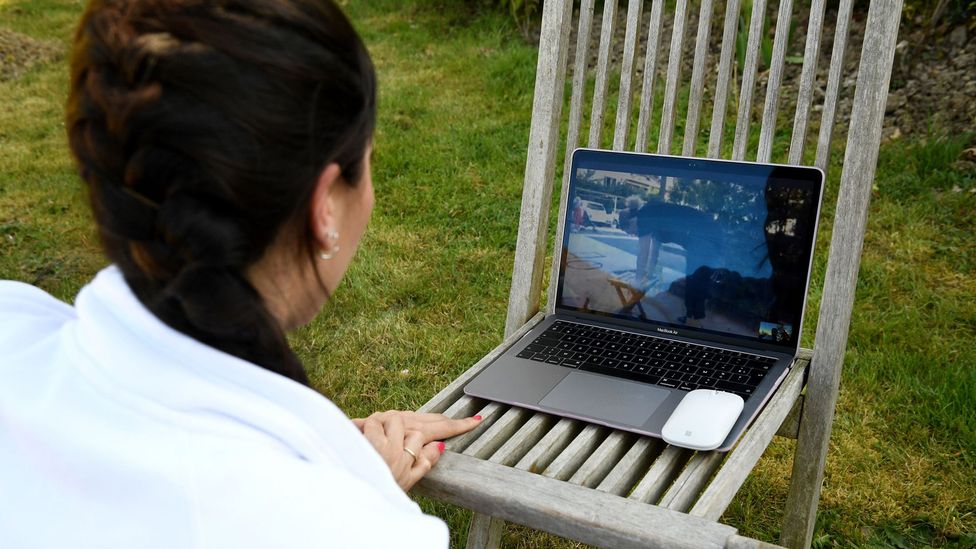Theres Always the Fatigue Call Funny
The reason Zoom calls drain your energy
(Image credit:
Getty Images
)

Video chat is helping us stay employed and connected. But what makes it so tiring - and how can we reduce 'Zoom fatigue'?
Y
Your screen freezes. There's a weird echo. A dozen heads stare at you. There are the work huddles, the one-on-one meetings and then, once you're done for the day, the hangouts with friends and family.
Since the Covid-19 pandemic hit, we're on video calls more than ever before – and many are finding it exhausting.
But what, exactly, is tiring us out? BBC Worklife spoke to Gianpiero Petriglieri, an associate professor at Insead, who explores sustainable learning and development in the workplace, and Marissa Shuffler, an associate professor at Clemson University, who studies workplace wellbeing and teamwork effectiveness, to hear their views.
Is video chat harder? What's different compared to face-to-face communication?
Being on a video call requires more focus than a face-to-face chat, says Petriglieri. Video chats mean we need to work harder to process non-verbal cues like facial expressions, the tone and pitch of the voice, and body language; paying more attention to these consumes a lot of energy. "Our minds are together when our bodies feel we're not. That dissonance, which causes people to have conflicting feelings, is exhausting. You cannot relax into the conversation naturally," he says.
Silence is another challenge, he adds. "Silence creates a natural rhythm in a real-life conversation. However, when it happens in a video call, you became anxious about the technology." It also makes people uncomfortable. One 2014 study by German academics showed that delays on phone or conferencing systems shaped our views of people negatively: even delays of 1.2 seconds made people perceive the responder as less friendly or focused.
You might also like:
• Why grocery shelves won't be empty for long
• Coronavirus isolation is creating new couples
• How to work from home, the right way
An added factor, says Shuffler, is that if we are physically on camera, we are very aware of being watched. "When you're on a video conference, you know everybody's looking at you; you are on stage, so there comes the social pressure and feeling like you need to perform. Being performative is nerve-wracking and more stressful." It's also very hard for people not to look at their own face if they can see it on screen, or not to be conscious of how they behave in front of the camera.
How are the current circumstances contributing?
Yet if video chats come with extra stressors, our Zoom fatigue can't be attributed solely to that. Our current circumstances – whether lockdown, quarantine, working from home or otherwise – are also feeding in.

A 2014 study found that delays on phone or conferencing systems shaped our views of people negatively (Credit: Getty Images)
Petriglieri believes that fact we feel forced into these calls may be a contributory factor. "The video call is our reminder of the people we have lost temporarily. It is the distress that every time you see someone online, such as your colleagues, that reminds you we should really be in the workplace together," he says. "What I'm finding is, we're all exhausted; It doesn't matter whether they are introverts or extroverts. We are experiencing the same disruption of the familiar context during the pandemic."
Then there's the fact that aspects of our lives that used to be separate – work, friends, family – are all now happening in the same space. The self-complexity theory posits that individuals have multiple aspects – context-dependent social roles, relationships, activities and goals – and we find the variety healthy, says Petriglieri. When these aspects are reduced, we become more vulnerable to negative feelings.
"Most of our social roles happen in different places, but now the context has collapsed," says Petriglieri. "Imagine if you go to a bar, and in the same bar you talk with your professors, meet your parents or date someone, isn't it weird? That's what we're doing now… We are confined in our own space, in the context of a very anxiety-provoking crisis, and our only space for interaction is a computer window."
Shuffler says a lack of downtime after we've fulfilled work and family commitments may be another factor in our tiredness, while some of us may be putting higher expectations on ourselves due to worries over the economy, furloughs and job losses. "There's also that heightened sense of 'I need to be performing at my top level in a situation'… Some of us are kind of over-performing to secure our jobs."
But when I'm Zooming my friends, for example, shouldn't that relax me?
Lots of us are doing big group chats for the first time, whether it's cooking and eating a virtual Easter dinner, attending a university catch-up or holding a birthday party for a friend. If the call is meant to be fun, why might it feel tiring?
Part of it, says Shuffler, is whether you're joining in because you want to or because you feel you ought to – like a virtual happy hour with colleagues from work. If you see it as an obligation, that means more time that you're 'on' as opposed to getting a break. A proper chat with friends will feel more social and there will be less 'Zoom fatigue' from conversations where you've had a chance to be yourself.
Big group calls can feel particularly performative, Petriglieri warns. People like watching television because you can allow your mind to wander – but a large video call "is like you're watching television and television is watching you". Large group chats can also feel depersonalising, he adds, because your power as an individual is diminished. And despite the branding, it may not feel like leisure time. "It doesn't matter whether you call it a virtual happy hour, it's a meeting, because mostly we are used to using these tools for work."
So how can we alleviate Zoom fatigue?
Both experts suggest limiting video calls to those that are necessary. Turning on the camera should be optional and in general there should be more understanding that cameras do not always have to be on throughout each meeting. Having your screen off to the side, instead of straight ahead, could also help your concentration, particularly in group meetings, says Petriglieri. It makes you feel like you're in an adjoining room, so may be less tiring.
In some cases it's worth considering if video chats are really the most efficient option. When it comes to work, Shuffler suggests shared files with clear notes can be a better option that avoids information overload. She also suggests taking time during meetings to catch up before diving into business. "Spend some time to actually check into people's wellbeing," she urges. "It's a way to reconnect us with the world, and to maintain trust and reduce fatigue and concern."
Building transition periods in between video meetings can also help refresh us – try stretching, having a drink or doing a bit of exercise, our experts say. Boundaries and transitions are important; we need to create buffers which allow us to put one identity aside and then go to another as we move between work and private personas.
And maybe, says Petriglieri, if you want to reach out, go old-school. "Write a letter to someone instead of meeting them on Zoom. Tell them you really care about them."
Source: https://www.bbc.com/worklife/article/20200421-why-zoom-video-chats-are-so-exhausting